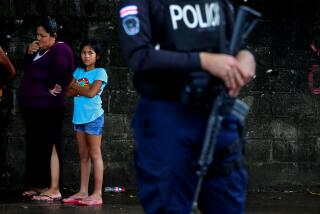Pro-Syria Premier May Be Reinstated
Following a massive pro-Syria demonstration a day earlier, Damascus’ allies here Wednesday nominated Prime Minister Omar Karami to the post he quit under pressure last week, a reversal that appeared likely to ensure Syrian control over Lebanon and served as a setback to opposition groups.
Karami’s renomination drew harsh reactions from the opposition, whose calls for a Syrian withdrawal from Lebanon have won backing from the United States, France, Saudi Arabia and other nations.
“We consider that it is a kind of provocation to come back with the guy who presented his resignation a week ago. It’s a joke,” said Samir Franjieh, a spokesman for the opposition movement. “It kind of says, ‘Nothing is changing in this country.’ This is the message of the renomination.”
A majority of the parliament’s 128 deputies favored Karami for prime minister during meetings with Lebanese President Emile Lahoud, guaranteeing his reappointment. Under the Lebanese Constitution, a parliamentary majority for Karami requires Lahoud to name him as prime minister. Karami has stayed on in a caretaker capacity since quitting Feb. 28 in the face of street protests.
The move to reappoint Karami followed Tuesday’s demonstration by about 500,000 supporters of the militant Hezbollah party who answered the group’s call to protest pressure from the United States and its allies for Damascus to cede control over Lebanese affairs.
Speculation had grown in recent days that Karami, who faced tense protests after the assassination last month of former Prime Minister Rafik Hariri, would be asked to form a new government before national elections planned for May.
The protests have drawn tens of thousands of people to Martyrs’ Square in downtown Beirut. The protesters were elated when Karami quit amid the public outcry over Hariri’s killing and Syria’s domination of the country’s political and economic life. U.S. officials described the fall of Karami’s government as a triumph for the Lebanese people and their bid for new elections.
But analysts and opposition figures said Lebanon’s pro-Syria leadership gained courage from a massive demonstration Tuesday by the militant Shiite Muslim group Hezbollah in support of Syria. A United Nations Security Council resolution sponsored by the United States and France called on Damascus to pull its troops out of Lebanon and quit meddling in its neighbor’s political affairs.
The Hezbollah event’s turnout -- estimated at 500,000 -- was far larger than any of the gatherings assembled by the opposition, which has been led mainly by Christian, Druze and Sunni Muslim politicians.
Adnan Iskandar, a political analyst in Beirut, said the move to put Karami back in charge of the government was an act of defiance by the pro-Syria leadership.
“It is, in a way, another decision in a series of blunders,” Iskandar said. “It’s really a continuation of the crisis. What’s needed now is a way to resolve the crisis.”
If Karami accepts the nomination, he will have to assemble a new Cabinet and could invite members of the opposition. But opponents say they would not consider joining a new government unless it satisfied key demands: allow an international commission to investigate Hariri’s killing, fire top intelligence officials and expel Syrian forces.
Opposition deputies attempted to deliver those conditions to Lahoud during his meetings with legislators Wednesday, but he refused to take them, said Fares Souaid, an opposition legislator. The opposition did not nominate anyone for the prime minister’s job, he said.
In Damascus, tens of thousands of demonstrators took to the streets Wednesday in defense of Syrian President Bashar Assad. Syria has said it will carry out a phased withdrawal from Lebanon in which it will redeploy troops from northern and central Lebanon to the Bekaa Valley, closer to Syria, by the end of the month.
The redeployment has begun, but Syria has not provided a timetable for a complete withdrawal of its 14,000 troops.
Syria was to have removed its forces years ago under the Taif Accord of 1989, which ended the Lebanese civil war and allowed Syria to maintain a temporary peacekeeping presence.
Iskandar, the political analyst, said Karami’s nomination was evidence of Syria’s continued reach into Lebanese politics. He said its sustained presence could influence the upcoming election for a new parliament, which in turn will choose a president.
In Washington, President Bush repeated his demands that Syria remove its troops and intelligence agents from Lebanon. Speaking to reporters in the Oval Office before a meeting with Romanian President Traian Basescu, Bush rejected Assad’s announced plans for a partial withdrawal of Syrian forces as a “half-measure” and pledged to continue working with allies for a complete pullout.
Secretary of State Condoleezza Rice told a House Appropriations subcommittee that the administration stood ready to help democratic forces in Lebanon.
“The people of Lebanon have an enormous opportunity to bring about peaceful change with elections,” she said in prepared testimony. “We will do all we can to support them in ensuring they are free and fair -- and this includes our continuing to insist on the withdrawal of all foreign forces.”
*
Times staff writer Tyler Marshall in Washington contributed to this report.
More to Read
Start your day right
Sign up for Essential California for news, features and recommendations from the L.A. Times and beyond in your inbox six days a week.
You may occasionally receive promotional content from the Los Angeles Times.






